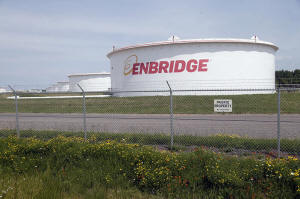Michigan appeals court upholds permits for Great Lakes pipeline tunnel
project
 Send a link to a friend
Send a link to a friend
 [February 21, 2025] By
TODD RICHMOND [February 21, 2025] By
TODD RICHMOND
Enbridge Energy's plans to build a protective tunnel around an aging
pipeline that runs beneath a channel connecting two Great Lakes can
continue, a Michigan appeals court ruled.
The state Public Service Commission properly issued permits for the $500
million project, the Michigan Court of Appeals ruled Wednesday in
rejecting arguments from environmental groups and Native American tribes
that commissioners failed to consider the overall need for the pipeline.
Tunnel would encase pipeline in the Straits of Mackinac
Enbridge wants to build a protective tunnel around a 4-mile
(6-kilometer) section of its Line 5 pipeline that runs along the bottom
of the Straits of Mackinac, which link Lake Michigan and Lake Huron.
Enbridge has been using the pipeline since 1953 to transport crude oil
and natural gas liquids between Superior, Wisconsin, and Sarnia,
Ontario.
Concerns about a potentially catastrophic spill in the straits have been
building since 2017, when Enbridge officials revealed that engineers had
known about gaps in the pipeline's coating in the straits since 2014.
Fears of a spill escalated in 2018 when a boat anchor damaged the line.
Enbridge officials maintain that the line is structurally sound, but
they still reached an agreement with then-Michigan Gov. Rick Snyder’s
administration in 2018 that calls for the company to build the
protective tunnel.

Environmental groups, tribes challenge state permits
The Michigan Public Service Commission issued state permits for the
project in December 2023. Environmental groups including the Michigan
Environmental Council and the National Wildlife Federation, along with
the Little Traverse Bay Bands of Odawa Indians, Bay Mills Indian
Community, Grand Traverse Band of Ottawa and Chippewa Indians, and the
Nottawseppi Huron band of the Potawatomi asked the appellate court last
year to reverse the commission's decision.
The groups and the tribes alleged that the commission improperly
considered only the public need for the tunnel rather than whether the
entire pipeline as a whole is still necessary. They also argued the
commission failed to adequately consider petroleum products' greenhouse
gas impacts.
[to top of second column] |

The corporate name stands out on tanks shown Friday, June 29, 2018
at at the Superior terminal of Enbridge Energy in Superior, Wis. (AP
Photo/Jim Mone, File)
 Court: Commission acted reasonably
The appellate court found that the commission issued a
“comprehensive” opinion and acted reasonably. It said there was no
basis for a reversal or to order the commission to revisit its
decision.
David Scott, a senior attorney for the Environmental Law & Policy
Center and the Michigan Climate Action Network, which are also
plaintiffs in the case, said in an email that he was disappointed
with the ruling and considering further moves. He didn't elaborate.
Environmental law firm Earthjustice represented the tribes in the
case. Adam Ratchenski, an attorney with the firm, said that
regardless of the appellate ruling, it was “backwards and dangerous”
for the commission to approve the tunnel without truly considering
whether Michigan residents need it.
“Nobody wants their water poisoned or their property values
torpedoed in order to keep Canadian oil and gas flowing through the
Great Lakes,” he said.
Enbridge spokesperson Ryan Duffy praised the appellate ruling,
saying the tunnel will make a safe pipeline even safer.
The legal fight isn't over
The ruling Wednesday doesn't end the legal battle over the tunnel.
Current Michigan Gov. Gretchen Whitmer, a Democrat, opposes the
continued operation of Line 5 even if it's encased in a tunnel.
Democratic Attorney General Dana Nessel filed a lawsuit in 2019
seeking to void the easement that allows the line to run beneath the
straits. That case is pending in state court in Ingham County. A
ruling could come any day.
Enbridge would still need a permit from the Michigan Department of
Environment, Great Lakes and Energy as well as federal construction
permits from the U.S. Army Corps of Engineers before construction
could begin. Environmentalists fear that President Donald Trump's
administration will fast-track that process after Trump declared a
national energy emergency on his first day in office.
All contents © copyright 2025 Associated Press. All rights reserved |